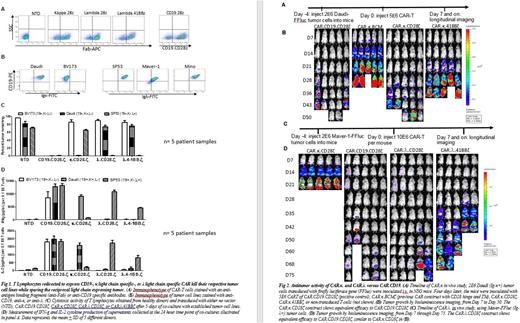Abstract
Background: Indolent B cell non-Hodgkin lymphomas (B-NHL) are typically described as having smoldering clinical courses. Chemotherapy plus CD20-targeting antibodies have made remissions in this type of disease possible, with fit patients sometimes consolidated with autologous stem cell transplant. However, these lymphomas commonly progress or relapse inexorably, requiring further interventions. Some B-NHL subtypes, such as mantle cell lymphoma (MCL) or advanced follicular lymphoma (FL) have unpredictable and sometimes clinically aggressive courses which are refractory to even frontline treatments, and remain principally incurable.
Adoptive chimeric antigen receptor T cells targeting CD19 (CD19.CAR-T) has shown therapeutic promise for these B-NHL subtypes. Targeting this antigen, however, does not distinguish between normal and malignant B cells and may cause B-cell aplasia and agammaglobulinemia when CD19.CAR-T persist long-term. FL and MCL, along with many diffuse large B cell lymphoma (DLBCL), express surface immunoglobulin (Ig) that is clonally restricted to either the kappa (Ig-κ) or lambda (Ig-l) light chains. We explored targeting the Ig-κ or Ig-l individually with CAR-T, which would possibly spare B lymphocytes expressing the reciprocal light chain, and consequently reduce the impairment of humoral immunity.
Methods/Results: Previous studies showed modifying the hinge and transmembrane (TM) regions could result in amplified tumor cytotoxicity. We explored refining our own CAR-T approach by first altering the hinge and TM regions of the CAR molecule itself, using the CD8a hinge and TM regions in lieu of the currently used CD28 hinge and TM sections. The costimulatory endodomains used were either CD28 or 41BB, each combined with the CD3ζ chain. When compared to the CD28 hinge and TM containing CAR molecules, we demonstrated the CD8a-containing hinge and TM CAR molecules targeting Ig-κ (CAR.κ) or Ig-l (CAR.λ) had augmented cytotoxicity, as well as increased IFNg and IL-2 cytokine production, in vitro against B-NHL derived tumor cell lines expressing Ig-κ or Ig-l, respectively. Furthermore, both CAR.κ and CAR.λ demonstrated selective cytotoxicity of the appropriately expressed tumor-associated immunoglobulin, while sparing the tumor cells expressing the reciprocal surface Ig.
We conducted in vivo experiments using a NOD-scid gamma (NSG) xenograft murine models. NSG mice were treated with CAR-T targeting CD19 (positive control), non-transduced cells (negative control), and depending on the Ig light chain target, either CAR.κ.CD28ζ and CAR.κ.41BBζ, or CAR.λ.CD28ζ and CAR.λ.41BBζ. We also established a humanized murine model that reconstituted human B lymphocytes in NSG mice post-irradiation using CD34+ umbilical cord blood cells, replicating a humanized humoral immune system replete with a full complement of humanized B cells. We then measured the selective ability of CAR.κ and CAR.λ cells to eliminate human B-lymphocytes expressing either the Ig-κ or Ig-l, respectively, while sparing the reciprocally expressed light chain-carrying B lymphocytes.
We found that CAR.κ and CAR.λ showed respective high cytotoxic activity, similar to CD19.CAR, against the appropriate Ig-κ+ or Ig-l+ B-NHL tumor cell lines in vivo within the NSG xenograft murine model. We also demonstrated the selective elimination by the CAR.κ and CAR.λ of either the kappa or lambda light chain-expressing B lymphocytes, with sparing of the reciprocal light chain-expressing B lymphocytes, in the humanized murine model.
Conclusion: Since κ/l expression is clonally restricted, and because mature B-lymphocyte derived malignancies are themselves clonally restricted, having a CAR-T that targets either light chain can potentially treat the full gamut of mature B-NHL subtypes. In addition, sparing the normal population of B lymphocytes would have negligible impact upon the patient's humoral immunity. Moreover, we showed equal efficacy of our CAR.κ.CD28 and CAR.λ.CD28 when compared with CD19.CAR. As such, adoptive transfer of CAR-T targeting the clonally restricted light chain can be a very feasible immunotherapy approach to treating advanced FL, MCL and DLBCL clinically, without entirely compromising humoral immunity.
No relevant conflicts of interest to declare.
Author notes
Asterisk with author names denotes non-ASH members.


This feature is available to Subscribers Only
Sign In or Create an Account Close Modal